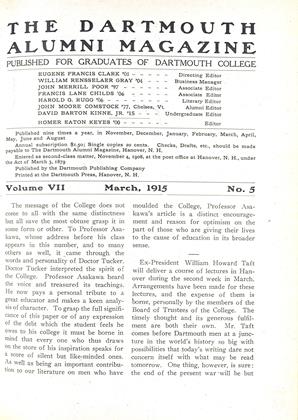Sometimes when reading Principal Comstock's careful obituaries in the succeeding issues of the MAGAZINE and hoping that he may be spared to do exact justice to my own, I have wondered if there might be room occasionally for words of praise of some living graduates, written while they survive to enjoy them. The two men whom I have in mind will never be able to donate a new dormitory to the College, nor have they the qualities that would bring a cheering crowd to its feet at an alumni banquet held to celebrate a football victory. But they have for many years in a quiet place and with no thought of fame exemplified certain austere virtues which it was the habit of the Old Dartmouth to inculcate. Graduated under a faculty of fourteen men, in the days when the College did not possess a bathtub, they had the still North in their hearts and the hill-winds in their veins, and they have always, as Hovey urged "Set a watch lest the old traditions fail."
Twice lately I have been up to Pennsylvania State College. It is, as many know, a somewhat remarkable institution. Situated in an isolation more complete than that of Hanover, it has had very much the same spirit of lonely independence, but within the past dozen years it has grown more rapidly than any other college east of the Appalachians, and now has a student body, winter and summer, of over three thousand.
Upon my first visit I saw both the men whom I wish to praise, for the first time together since we were in college twenty-five years ago. For twenty of these years they have been colleagues
at State College, and both are now heads of their respective departments. I had anticipated the visit with the friendly curiosity that belongs to one who wishes to know how the world has treated the chums of his boyhood.
"Joe" Willard of the Class of 1887 and "Father" Pattee of the Class of 1888 appear at first glimpse a bit cadaverous. They look like men who have toiled terribly. A second view shows they have worn themselves thin with no loss of courage, and that they are still forward-looking men. But consider for a moment the possibilities of power that lie in the lifetime of an educated schoolman who that lifetime to one institution. What must it mean to have begun to teach where there are three hundred students and to stay till there are three thousand? But numbers are not much. It is something more for each of these men to have a dozen men under him, chosen by himself for his department, and working as one team for a scholarly end. It is even more when a man like Pattee upholds the ideals of English literature for twenty years in a college, largely of agricultural students who think that not much more than letterwriting is "practical" or for a man like Willard, who teaches mathematics, to stand sturdily for the old classical ideals. Cheering is it to know that such championships have not been in vain, and that the existence of a School of Arts at State College is chiefly the creation of these two men.
The older Dartmouth men were called narrow, but it could not be said of these two. To Willard chiefly is. due the perpetuation of the College Y. M.
C. A., whose notes he has for years endorsed, and the existence of the beautiful Presbyterian Church. To Pattee comes the credit of the institutional Methodist Church, close to the Campus. Pattee too, is almost the only Dartmouth man of his generation who has patiently followed the path of creative literature, not alone in his critical textbooks but by his honestly wrought novels and verse.
President Bartlett used to tell us that Dartmouth stood for morals, health and learning, in the order indicated. Whatever be the present-day arrangement that is popular, these two Dartmouth men have not forgotten the first. Both of them go out and preach in the country school-houses. Pattee is an acceptable preacher at the College, and Willard has a record for persistent chapel attendance which his colleagues envy but do not imitate. Willard too has shown his interest in the individual student by a famous card catalogue which he has sat up nights to compile, by which any returning student may stare his old past in the face at a moment's notice. He is also credited with speaking kindly of every colleague with whom he has ever differed in faculty meeting. And it is one of the fine traditions, a memory so sacred that some cannot recount it, that one of the great moments in the life of the College was when this professor of mathematics stood quiletly forth and recited "Sunset and Evening Star" at the burying of President Atherton.
Dartmouth has recently honored herself by conferring the degree of Master of Science upon Joseph M. Willard. Let us hope that she is not unmindful of the merits of Fred Lewis Pattee. For surely in the fullest measure these Sons of Old Dartmouth have kept "for her the old chivalric faith."
 View Full Issue
View Full Issue
More From This Issue
-
 Article
ArticleWILLIAM JEWETT TUCKER
March 1915 By Kan-Ichi Asakawa '99 -
 Article
ArticlePROBLEMS IN PREPARATORY SCHOOL ATHLETICS
March 1915 By Walter H. Lillard '05 -
 Article
ArticleThe message of the College does not come to all with the same distinctness
March 1915 -
 Article
ArticleALUMNI PUBLICATIONS
March 1915 -
 Class Notes
Class NotesLOCAL ASSOCIATIONS
March 1915 -
 Class Notes
Class NotesST. LOUIS ASSOCIATION
March 1915 By LEIGH C. TURNER '04








